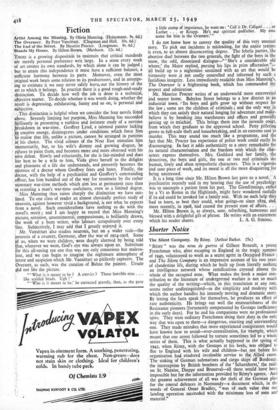Fiction
;THERE is a growing disposition to maintain that critical standards tie merely personal preference writ large. In a sense every work -Of art creates its own standards, by which alone it can be judged ; but to attain this independence it must have a sufficient balance, a 'sufficient harmony between its parts. Moreover, even the Most ,.; . .onginal work bears some relation to, its predecessors, and in atteuipt- . • mg to estimate it we may never safely leave. out the history of the art to which it belongs. In practice there is .a good rough-and-ready 'distinction. To decide how well the job is done is a technical, ,:41jective matter. To decide whether-it was worth doing, whether the result is depressing, exhilarating, funny and so on, is personal find . subjective. JiThis distinction is helpful when we consider the four novels listed above. Severely limiting her purprise, Miss Manning has succeeded killiantly in presenting a ruthless and intimate study of a nervous • preakdown in war-time.. Geoffrey Lynd, a talented painter lacking Iicreative energy, disintegrates under conditions, which force him realise that life, unlike a pictUre,' cannot be arranged in patterns app his choice. The vivid colours of the 'Near East stimulate him momentarily, but, to his wife's dismay and growing disgust, refuses to paint them, and becomes more and more obsessed with his Own defeat. Slowly and reluctantly, for she is fair-minded and does .114 best to be a wife to hitn, Viola gives' herself to the delights and pleasures of a life she understands, and presently becomes the Mistress of a doctor whom Geoffrey fears and hates. Finally, the doctor, with the help of a psychiatrisi and Geotfrey'S commanding 'officer, has him bundled out of the way for treatment by the rather summary war-time methods which aim less at permanent cure than .at restoring a man's war-time usefulness, even to a limited degree. Miss Manning thus raises sharply the distinction we have Out- . lined. To one class of reader an almost classically perfect study of neurosis, against however vivid a background, is not what he expects from a novel. Such considerafions have nothing to do With the novel's merit ; and I am happy to record that Miss Manning's picture, sensitive, unsentimental, compassionate, is brilliantly drawn, the work of a born writer, Who 'labours scrupulously over every `line. Subjectively, I may add that I greatly enjoyed it.
Mr. Vansittart also studies neurosis, but on a wider scale—the neurosis of a country, Germany, after the war of 1914-1918. Sortie if us, when we were Children,. were deeply alanned by being told jut, wherever we went, GOd's eye was always Upon us. Substitute or this all-seeing eye one that was not only censorious but makvO- ent, and we can begin to imagine the nightmare atmosphere of terror and suspicion which Mr. Vansittart so pitilessly Captures. The Overseer, as such, was the creation. of Bahne the painter.. Ursule slid not like the picture.
" ' What is it meant to be ? A convict ? Those horrible eyes .
like scalded beads. Ugh ! '
" Who is it meant to be,' he corrected gravely, then, as she gave a little stamp of impatience' he went on: 'Call it Dr. Caligari . „or Luther . . . or Krupp. He's our spiritual godfather. My own name for him is the Overseer.' " I do not know how to convey the quality of this very unusual story. To pick out incidents is misleading, for the entire texture is even, to an almost disconcerting degree. The febrile parties, the abortive duel between the two generals, the fight of the -boys in Snow, the odd, dissociated dialogue—" She's a considerable old Whore,' the Major replied, pursing his lips in prim affectation ' 411 build up to a nightmare sustained with an art that would: be yirtuosity were at not coolly controlled and informed by such a fastidious integrity. Less immediately readable than Miss Manning's, The Overseer is a frightening book, which has commanded 'My respect and admiration.
; Mr. Maurice PrOcter writes of an underworld more extroverted and nearer home. Babylon Street belongs to a low district in an _industrial town. Its boys and girls grow up without respect for the law ; some are the children of criminals ; and the only way in which they can satisfy their natural longing and adventure and make- believe is by .breaking into warehouses and offices and generally ;getting up to mischief. This brings thent into the .juvenile court, from which they graduate to the approved school. Petty pilfeiing 'grows to full-scale theft and housebreaking, and in an extreme case:to murder. This may sound too much like a programme, and 'the fact that Mr. Procter has experienee of police work could easily be discouraging. in -fact it adds authenticity to a story: remarkable for its natural- characterisation and the freedom with which the char- acters express themselves. Mrs. Goddard and her family, the detectives, the boys and girls, the one or two real criminals Ste human, lively and often sympathetic characters. This is a vigorous and sane piece of work, and its moral is all the more disquieting for :being unstressed.
. h is a long time since Mi. Hilton Brown.last gaVe us a novel. ','A psychiatrist recently said in my hearing that the use of psycholOgy was to uncouple a patient from his past. The Glendinnings, exiled by a Vi to Romie in the Highlands, might have wondered ruefully if its aid could be invoked for a family seat. With no such help thy had to learn, as best they could, what goings-on since 1829, and; more recently; in 1908, had caused the present state of affairs. . . . Mr. Hilton Brown is, as always, sane, refreshing, humorous: and blessed with a delightful of phrase. He writes with an enjoyment














































 Previous page
Previous page